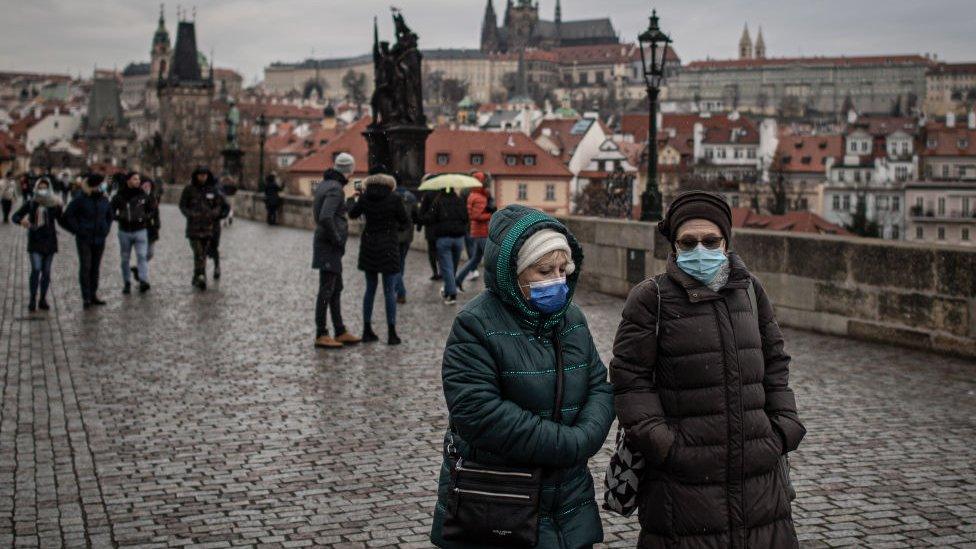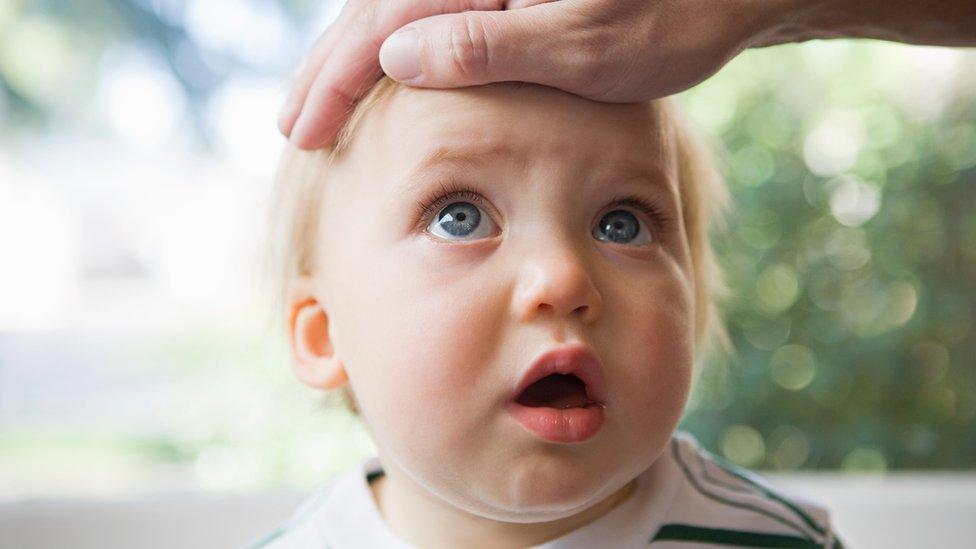Czech Republic struggles to contain surge of whooping cough
- Published

Some colleagues of Prague's mayor say he should have worn a face mask in public (file photo)
Whooping cough is on the rise across Europe, and the Czech Republic is no exception. However, a week marked by confusion surrounding official guidance and a controversial public appearance by Prague's mayor has left some wondering if anything was learned from Covid-19.
In the first week of January, say the Czech authorities, there were 28 registered cases of whooping cough.
That figure now stands at 3,084 – a number not seen since 1963.
Sufferers include the 80-year-old mayor of Prague, Bohuslav Svoboda, who is an MP as well as an eminent gynaecologist.
Coughing and spluttering his way through a parliamentary health committee meeting, a clearly irritated Dr Svoboda questioned why he had to be there in the first place.
He said he was recovering from whooping cough, but was on day six of an antibiotic course "so I'm no longer infectious… or at least that's what they taught me at school".
Most colleagues in the room chortled. One, however, said he could at least have worn a face mask.
For the Prague branch of the Green Party it was no laughing matter. Public health regulations dictate that those with whooping cough must stay at home until the end of their antibiotic treatment.
The party has filed criminal charges against the mayor for "spreading a contagious disease".
As cases continued to rise, the Prague public health authority took matters into its own hands. It sent out a letter to the capital's schools, saying in the event of a confirmed case of whooping cough in a class, any unvaccinated children must be sent home.
This was immediately shot down by the head of the national public health authority, who admonished her Prague colleagues at a press conference. Schools had no authority to send home unvaccinated children as a precaution, she said.
Instead, all cases should be judged individually, based on how long the infected child had spent in the classroom, and so on.
Epidemiologists, including one who led the government's measures against Covid, shook their heads in disbelief. Recently amended health ministry guidelines called for exactly the approach recommended by the Prague authority, they said.
But the confusion over the official guidance obscured a curious conundrum; what unvaccinated children?
Vaccination for whooping cough, known in Czech as "black cough", is mandatory in the country.
It is meant to be administered, alongside inoculation for diphtheria, tetanus, polio and others, from the very first weeks of life.
Yet according to official figures, immunisation for whooping cough is estimated at 97% of the infant population, suggesting there are thousands of unvaccinated babies in the Czech Republic.
Health Minister Vlastimil Válek told Czech Television the current rise in cases is down to a combination of two things: a resurgence in respiratory diseases as society abandons strict Covid measures; and incomplete immunisation in children.
The whooping cough vaccine is applied in five stages, the first three in the first 12 months of life. Almost all children receive these initial doses.
However, only 90% end up receiving the final two, administered around the ages of six and ten.
This, said Mr Válek, would explain why the greatest rise is among Czech teenagers.
Parents have been urged to check their children's vaccination history. Adults are encouraged to go for booster shots.
In years gone by, dozens if not hundreds of babies and young children died in what was then Czechoslovakia from whooping cough each year, until the introduction of mandatory vaccination in 1958.
Experts say the modern population is still well protected by mass, state-administered compulsory vaccination.
The resurgence in cases, however, still carries dangers.
Those infected teenagers may suffer nothing more serious than a persistent cough. But they can still pass on what can be a fatal disease to their younger siblings - whose immunity is still forming - or indeed their grandparents, whose immunity may have faded.

What is whooping cough and what are the initial symptoms?
Whooping cough (also known as pertussis) is a contagious infection in the lung or breathing tube.
The first signs of whooping cough are similar to a cold, with a runny nose and sore throat.
But after about a week, the infection can develop into coughing bouts that last a few minutes and are typically worse at night.

Related topics
- Published7 March 2024
